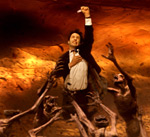AP: Did you grow up rooted in the Christian mythology "Constantine" is based on?

Reeves: I did not. I mean, I went to a Catholic boys' school for a year, but that was to play hockey. Religion class was quite contentious for me.
AP: So did you have to research the mythology for the film?
Reeves: I really took it in-house. The Constantine character has a kind of flesh-and-blood practical look at things that would seem, other people would use the word, occult or spiritual. But here, demons are real. So for me it was more taking it from the film itself. I didn't really need to go outside the piece itself to inform me because the perspective on it, what the character does, was provided by the script.
AP: He's matter-of-fact about the demon world.
Reeves: Yeah, that was my take on it. Performing an exorcism was like changing your oil. It's a drag, but necessary.
AP: What are your notions of heaven and hell, eternal damnation vs. eternal bliss?
Reeves: Well, I hope I get the bliss. And I know I'm going to have to work for it. But I've got to say, really, I have no kind of, can I say "secular religiosity"? ... I don't have a denominational sight. I think, like in the stories that we tell, there is an aspect of the living life informing where we go. A transfiguration, there must be. Energy can't be created or destroyed, and energy flows. It must be in a direction, with some kind of internal, emotive, spiritual direction. It must have some effect somewhere. ... I do think there must be some kind of interaction between your living life and the life that goes on from here.
AP: What would be your concept of a personal hell for all eternity? And don't say a press junket that never ends.
Reeves: No, no, this is not hell. I guess living without love, without experiencing it or being able to give it. I think the aspect of that would be, that's pretty strong punishment.
AP: "The Matrix" films and now "Constantine" have spawned video games. Is it strange to see a likeness of yourself in them?
Reeves: I think of it as, me performing Constantine is the same as the character Constantine becoming a video game. It becomes inspired by another kind of entity. It is surreal. But I did "Bill & Ted's Excellent Adventure." They made a cereal out of it, so once you've had a cereal, it doesn't get much more surreal than that. Surreal cereal.
AP: After "The Matrix" movies, you did supporting roles in a bigger movie, "Something's Gotta Give," and a smaller one, "Thumbsucker." Was it a palate-cleansing thing to do supporting parts before taking on another huge project like "Constantine"?
Reeves: It was kind of an open-ended question of where is some good work to be had? I wanted to act, and these were projects that my manager and agents found, and so I went to some meetings and liked the people involved. Nancy Meyers, and to work with Jack and Diane Keaton. It was a really good role, something I hadn't done in a long time. Light romantic comedy, I hadn't done that for a while.
AP: What kind of movie is more fun to go to work on in the morning, the big "Constantine" production or a smaller, more intimate movie like "Thumbsucker"?
Reeves: Sometimes, with the scale of a film, it's like when I walked on the sets of "The Matrix," especially in "Reloaded," there was the city square, or in "Revolutions" with some of the machine world, you're like, "Wow, this is a big playground," which is fun to watch. But the acting experience and the collaborating and creating the world, working on the piece, they're the same joys.
AP: Your thoughts on turning 40 last summer? Milestone, or just another birthday?
Reeves: No, it wasn't just another birthday for me. ... It carried quite a wallop. I have all the classic symptoms. Reflection. Where am I now? Where have I come from? What's important? Dealing with the moment of a different kind of feeling for mortality. Shifting of the body. Contextualizing or reevaluating behaviors and values. All those kinds of things.

